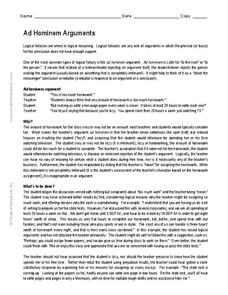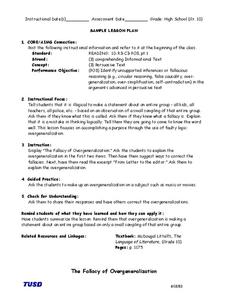Student Handouts
Logical Fallacies
Help your learners grow their critical thinking and analytical skills by asking them to examine logical fallacies. After reading an example, pupils determine if two sets of premises and conclusions are logical fallacies or not and...
Student Handouts
Ad Hominem Arguments
Give your class a lesson in logical reasoning. This learning exercise, which focuses on ad hominem arguments, goes step by step through an example. After examining the argument, learners assess a second conversation for ad hominem...
Curated OER
House and Holmes: A Guide to Deductive and Inductive Reasoning
Test your pupils' reasoning skills with several activities and a quick mystery to solve. Learners watch and analyze a few video clips that demonstrate reasoning in action, practice deduction with an interactive and collaborative...
Scouts
The Deadly Picnic: A Lab on Deductive Reasoning
Whodunnit? Find out who killed Mr. Brooks through a logical examination of evidence. Class members fill out a couple of data tables to help them pin down the suspect. After they've figured out just who the culprit is, pupils compose...
Two Lives Left
Cargo-Bot
What would you think of an app that provides a creative introduction to an important 21st century skill, challenges learners at many levels, and is an addictively, fun game? Did we also mention it was free? We think you will find all...
Krzysztof Haft-Szatynski
Move the Turtle
Turtles are not known to be speedy movers, but have you ever tried to get them to move in a specific direction? How about getting them to move in a perfect circle? With this app, young computer programmers have to be on their toes to...
Curated OER
Lesson: Urs Fischer: Controlling our Logic, Metaphors, and Semantics
Kids use poetry and contemporary art to start thinking about logic and personal expression. They read Sylvia Plath's poem "Metaphor," and critically examine the art of Urs Fischer. After working though a few logic problems they write...
Curated OER
Sorting
Young scholars examine Library organization. For this logic lesson, students watch a Between the Lions episode and consider how the library has been organized. Young scholars each list their 3 favorite book titles and how they would...
Curated OER
Is it alive?
Kids in grades K-2 increase their logical reasoning and visual discrimination skills by determining which things shown are alive. They use the criteria that all living things move on their own to mark each image as alive or not.
Curated OER
Balls & Hoops : Fun with Balls and Tubes
Learners race to keep these balls rolling. In this early childhood physical education lesson, students experiment with cause and effect as they work with different heights of cardboard tubes.
Curated OER
Sort It Out
Elementary schoolers engage in a game of logical reasoning called Secret Sort. A Venn diagram is used as a way to sort objects. This resource would be a great way to introduce the Venn diagram (maybe the most famous, and most-useful...
Curated OER
Summer Machines Activity: How Can We Move This Box of Blocks?
Students discover there's more than one way to move a heavy load. In this problem solving lesson, students use observation and problem-solving skills as they experiment with simple machines in order to transport loads.
Curated OER
Probability Scale 0 to 1
Use a probability scale line to help introduce learners to odds and probability. They start by examining an example line, looking at where events would fall from 100% probability to 0%. Next, learners complete two of these on their own,...
Curated OER
Logic Problems
Using the number attributes they have learned, math detectives uncover the mystery number in each of these logic problems. For the three problems they examine the clues and sets of numbers, using key vocabulary such as greater than, less...
Curated OER
Bridge-Crossing Puzzle
In this bridge-crossing worksheet, students read a word problem. They use logic and deductive reasoning to determine the correct combination for two men to cross a bridge at the same time to get the anticipated results. This one-page...
Curated OER
Secret Country Code Breaker
Super cool and totally fun math awaits your class. They are the code breakers, and their job is to identify and locate the secret agent by breaking two different codes. They use all their skills to solve a series of double-digit addition...
Curated OER
Lesson 12: What Reasonable Conclusions are Possible?
Oftentimes, we jump to conclusions when we are given a limited amount of information. Take a look at reasonable conclusions with your communications studies class. If-clauses, dichotomous thinking, and assumptions are all covered with...
TryEngineering
Circuits and Boolean Expressions
Teach basic logic using Boolean operators. Young computer scientists learn about the operators NOT, AND, and OR, and how they can be expressed using Boolean notation, logic gates, or truth tables. Along the way, they learn about half...
Southern Nevada Regional Professional Development Program
Common Core Reading Standards: Understanding Argument
What does your class know about logical fallacies? They can find out quite a bit and practice identifying logical fallacies if you follow the steps and use the resources provided here! After reviewing ethos, pathos, and logos, ask small...
Curated OER
Thinking About Hate
This lesson starts out with a guided discussion about the statement "Birds fly in the sky; airplanes fly in the sky; therefore, airplanes are birds" and goes on to cover logical fallacies and reliable sources, relating these to the topic...
Curated OER
Comprehending Informational Text
Do you know what a fallacy is? Discuss this term and its meaning with your class. Then, talk about why making generalizations about a large group of people isn't the best thing to do. As a group, study the included letter excerpt. It...
Curated OER
Organizing Your Argument
Constructing a well-organized argument is the focus of this tutorial, originally created for the Purdue University writing program. The slides can be adapted for any composition course or writing unit.
Curated OER
Graphic Scores
You can write some music scores using images rather than musical notation. Kids learn how they can become musical composers by using graphics or images in place of musical notation. An interesting slide-show, but a more interesting...
Curated OER
Investigation - Design Your Own Spinner
Seventh graders use ideas of uncertainty to illustrate that mathematics involves more than exactness when dealing with every day situations. The main standard of this instructional activity is statistics and probability.

























